HOME | ABOUT US | MEDIA KIT | CONTACT US | INQUIRE
HOME | ABOUT US | MEDIA KIT | CONTACT US | INQUIRE
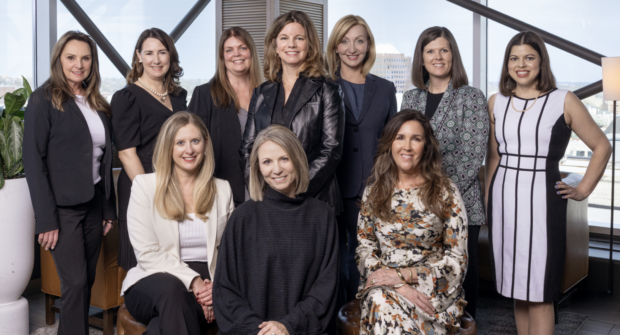
PUBLISHED MARCH 2025
It’s an unusual moment in American business, one perhaps fraught with more anguish than ever about the basic concept of fairness. This, in a nation that prides itself on being a beacon of opportunity to the world.
The past two months have inspired considerable debate about the role of programs aimed at advancing opportunities for women and minorities in the workplace. For women in particular, much of that debate has been settled over the past half-century: They now account for more than half of the college degrees issued in America, and their college enrollments have exceeded those for men for more than 40 years. Simply put, they’re better-educated as a group.
Despite that, there’s ample evidence that women aren’t getting a fair shake in the workplace. Far from it: Roughly 25,000 sex-discrimination charges are brought by the Equal Opportunity Employment Commission each year. The vast majority, by the way, are not sexual-harassment claims. There is a difference.
The reality is, any company in America that overlooks a qualified woman for any job, especially in leadership, is rolling the dice on its prospects for long-term success. At public companies, in particular, the potential risk is far greater, as it invites legal action against those responsible for failure to maximize shareholder value.
The bigger emerging threat to many women in business is as owners: President Trump’s executive orders may imperil many who have leveraged woman-owned business status to secure federal contracts. How that plays out in court is anyone’s guess.
So, yes, there is still ample reason to spotlight the success of women in leadership roles. That’s why WeKC exists. For nearly 25 years, we’ve shown the very best of what the Kansas City region has to offer in that regard.
This year, we have 13 more causes for celebration with the Class of 2025. We defy anyone out there to suggest that what they’ve achieved wasn’t the result of their hard work, their determination or—yes, we’ll say it—merit. They’ve earned this.
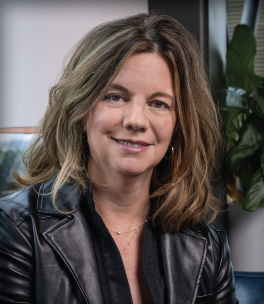 Amy Castillo, President/CEO, Ability KC
Amy Castillo, President/CEO, Ability KC
As servant leadership goes, Amy Castillo descends from a particular stripe of that mindset: her grandfather, father and brother were all Missouri law-enforcement officers. “Service was the legacy of family,” says Castillo, who leads an enterprise that serves roughly 3,100 individ-uals a year. Many of those are challenging cases that involve serious illness or injury—from strokes and spinal injuries to traumatic brain injuries and amputations. A personal commitment to education before her career began took her to Mizzou, where she majored in exercise science and psychology, then to Baylor for a graduate degree in exercise physiology, and the University of Dallas for her MBA. Cerner Corp. was nearing the peak of its growth after pivoting from building out health-care IT systems and into population health analytics when Castillo came on board in 2007, “eager to explore how tech innovation would drive health care going forward,” she says. After moving into marketing roles with Viracor and HCA Midwest Health, she landed at what is now Ability KC—formerly the Rehabilitation Institute of Kansas City, after its merger with Children’s TLC—and became CEO in 2017. Coming on board there, she says, was a logical next career step. “My entire career is centered upon leading in complexities, building integrated organization and team experiences that respect and foster curiosity, adapting to unpredictability, and creating opportunities.” To navigate those complexities as a leader, she says, “it is important to build a culture experience together with your team and partners. My most valuable skills are my strength and comfort in ambiguity, creating a climate of learning, creativity, problem solving and innovation. People together, not one leader, build and evolve a culture journey that drives successful impact.” So how do aspiring leaders of tomorrow chart similar paths? “Value curiosity and continual learning, and you will advance in your career more through the challenging experiences and lessons learned,” she says. For young women in particular, especially within the health-care realm, the opportunities are plentiful. “Health care is an industry of innovation and offers a wide range of opportunities,” Castillo says. “It is important and strongly advised that those considering the industry invest in understanding health-care economics and finance. Ability KC is a leader in bridging the conventional health-care model with revenue diversification to support our mission.” Health care is interconnected, she notes, so Ability KC embraces an integrated model of medical professionals, teachers, neuropsychologists, social workers, workforce development specialists and more, working together.
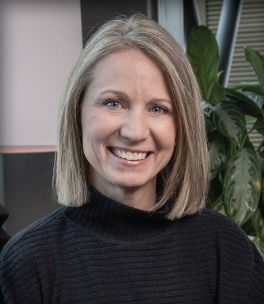 Jackie Foy, Architecture Managing Principal, HDR
Jackie Foy, Architecture Managing Principal, HDR
At first blush, there might seem to be a tension between breaking molds and clinging to values. There isn’t, as Jackie Foy is here to assure you. Time spent on the farm growing up in Nebraska instilled an embrace of hard work and the notion that one does what one promises to do, she says. Neither of those precludes someone from venturing down the road less taken. In her case, as a middle schooler, with instruction in shop, welding and woodworking—traditionally, the “boy” classes. “I loved those,” says Foy. “Plus art and history classes. In my last year of middle school, I had an 8th-grade drafting class, building models with electrical and plumbing systems designed.” Art and math classes showed her that the fundamentals of engineering can accommodate a creative side, giving her the ability “to make something out of nothing.” Since 2023, she’s been with HDR, brought on board specifically to build out an architecture practice in the Kansas City office, where she has turned a team of three into three dozen. A KU grad, she’s spent much of her career focused on design of health-care facilities, but has found an additional measure of growth as a leader. “The biggest thing that called out to me was the pull of my team” when she moved into her current role, she says. “We all work together as a team. I succeed not because of what I do, but because of what we can do together, with our individual strengths and weaknesses. Understanding that the team is constantly evolving and changing, offering opportunities to grow, and at a firm that reciprocates that and is willing to invest in our growth.” It is, she says, purpose-driven working that aligns with a higher calling. A value carried into her career from back home is being willing to go the extra mile, she says, and “to do things today rather than tomorrow. Do what you say you’re going to do also goes a long way.” Moving into a leadership role, Foy says, wasn’t the result of a particular plan; “it was probably more because the opportunities that presented themselves, and being prepared for those opportunities.” Not coincidentally, that’s the mindset she encourages young designers—especially women—to take as they try to imagine the course of their own careers. It also helps, she says from her own experience, “to be willing to just dive in and try things. Going in with an open mind, no preconceived notions of what a given role or career will mean.” In that free-wheeling approach, people can take control of their careers, she says, “so don’t be afraid to make yourself what you want to be.” Too often, she counsels, people who are young or new to a firm tread lightly and wait to fully engage until someone asks them to. “Don’t be afraid to take initiative or do additional research, dive into it and learn a lot along the way,” Foy says. “Having the ability to push through hard things, sometimes that helps you find your passion as you dive into the weeds and the details.”
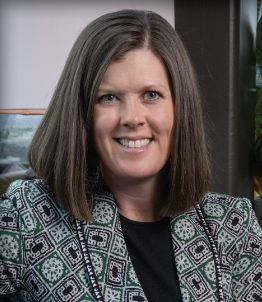 Kersten Holzhueter, Partner, Spencer Fane
Kersten Holzhueter, Partner, Spencer Fane
What helped make Kersten Holzhueter a financial-services litigator? A big part of the answer lies in headlines from the past. One involved the Enron fraud scandal of 2001, which became study fodder for her accounting classes in college. The other was the mortgage crisis of 2007, during her internship at Spencer Fane, when she took on a project related to cases involving securitized mortgages. Had it not been for either development, she might have happily moved along into an accounting career. “I’ve always enjoyed numbers and my dad is a CPA, so it felt a little familiar,” she says of her college studies. There’s more to her story, of course: Growing up near Madison in a family of five, with parents who were—and still are—big supporters of education, she says. “So I embraced my inner nerd at a young age. I loved puzzles, soccer, and gymnastics. With busy sports schedules, I learned the importance of managing my time at a young age.” The Enron element showed up during business law classes for accounting; until then, “I had never thought about applying to law school,” she says. But those classes sparked her interest in the give-and-take of debate, and law school at the University of Iowa followed. Once on board at the firm in 2010, she headed toward financial-services litigation, which allowed her to draw on her ac-counting background. She also relies on analytical thinking. “I like incorporating tables and flowcharts into court filings to explain legal positions in the most concise and logical manner possible,” she says. As a perpetual optimist, Holzhueter says, “I love highlight-ing the big picture benefits for a legal career: every day is different and there are so many opportunities to pick a slightly different path in the practice of law if you aren’t loving your current day-to-day.” And when her own day-to-day is infused with an unexpected challenge, it’s game-on. “I must confess, the initial reaction is often stress about how we are going to sort through the issue,” she says. “But, then I flip a switch in my head and say ‘challenge accepted.’ I come up with an initial game plan and then bring in my colleagues to brainstorm. I rely on my optimism to keep us motivated to tackle the challenge.” To anyone just starting out in their careers, Holzhueter offers some guidance on how to get from the blank slate to the realized vision. “Be curious,” she says. “Ask mentors how your day-to-day tasks factor into the broader business plan, how you can learn more about the organization and leadership opportunities, and how you can help make your mentors’ jobs easier. And, don’t be afraid to express interest in leadership opportunities even if it feels early. It can take time for the right opportunity to emerge. Which highlights the final piece of advice: be patient.”
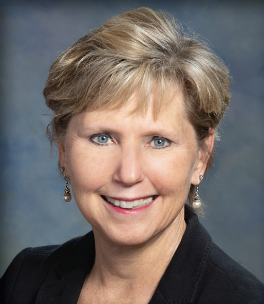 Jani Johnson, CEO, Saint Luke’s Hospital
Jani Johnson, CEO, Saint Luke’s Hospital
On the road to executive leadership at one of the region’s biggest medical centers, Jani Johnson learned some important lessons about limitations, and looking past them. One came from her mother, who earned a master’s degree in education after her 50th birthday. The other came from Johnson herself, who learned that it’s never too early to start collecting a paycheck. “My first job was as a swimming instructor at age 13, followed by a job working in customer service at a large retail store. I can look back now and see that many of those jobs I did were stepping stones. They helped make me who I am today and laid the foundation for the kind of leader I want to be.” That’s how she ended up on track to lead a major research hospital that admits roughly 20,000 patients a year and generates $4 billion in revenues. Her story testifies to the power of growing up with strong role models. The third of four children, she’s an Omaha native who says education and work ethic were foundational values in the family home. “There was never a question about whether my siblings and I would obtain a college education,” Johnson says. “That expectation was set at an early age.” A passion for taking care of people drew her to nursing school; “I wanted a career that would help me make a difference in others’ lives,” she says. “Nursing offered many different opportunities to do exactly that. Graduate school was helpful to me—I certainly gained the knowledge I needed to be successful—but throughout my career, I have been blessed with many mentors. They have had the greatest impact on my education. They were my best teachers and the most influential forces in my professional life.” One of them, in fact, steered her on the path to leadership. “That advice resonated with me,” Johnson says. “I realized the importance of good leadership and its direct correlation to excellent outcomes in retention, staffing, and patient care. I also recognized that my clinical experience working at the patient bedside gave me necessary insight.” Specifically, into how things get done, which she says is critical information for any leadership or business decision. “I knew a leadership role might eventually take me away from regular, direct patient contact, but I would be gaining the ability to make a greater impact for all patients and my colleagues. I gravitated toward that opportunity.” As a leader, she values collaboration, conflict resolution, and the ability to inspire and motivate her team. While the work is incredibly challenging, she says, “we have been given a special responsibility—an opportunity—to care for our community. This gives our employees tremendous pride in their organization. Our ‘why’ really matters in health care. Our team members are here for more than a paycheck; they are here for the difference they can make.”
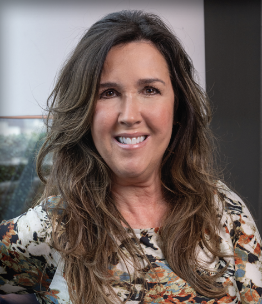 Lisa Kallmeyer, EVP, LANE4 Property Group
Lisa Kallmeyer, EVP, LANE4 Property Group
Be honest here: How many college-age women get to campus thinking, “I want to go into commercial real estate?” Well, Lisa Kallmeyer was one of those, and at a time when women in the profession were exceptions. There wasn’t yet a clear academic pathway to that track, so she chose communications studies for her degree at the University of Kansas. “Counselors said a liberal arts degree would provide a well-rounded background and would be helpful in whatever I would pursue,” she says. That pursuit eventually led to LANE4, where she leads the management division for 3 million square feet of retail, office, industrial and mixed-use properties. And the skills she began honing back at KU are still fundamental to success. “No matter what business, you’re in, you need to communicate effectively,” Kallmeyer says. “What I do every day demands this: building relationship with tenants, clients, owners, new business development and training and working closely with the team.” She’s a native of Texas who finished high school in Chicago and has been in Kansas City for nearly 30 years, having met her future husband in Lawrence. When she embarked in commercial realty, the reception wasn’t uniformly … enthusiastic. “Oh, yes, there were so many people who literally looked me in the eye and said you’re 21 years old; why would you want to be a property manager?” So yes, she does feel as though she helped pave the way for other women to enter the sector. “In my mind, and it’s still true today, I thought I was going to be doing what I was interested in, working with tenants and building relationships, which I still enjoy,” she says. “Back then, a lot of those who were talking to me were operations guys who couldn’t understand why I had an interest.” By 23, she was on the staff managing Corporate Woods, the region’s premier office park, and was off and running. The keys to her success? “Listening is the biggest one for me, the most important, being truly interested in what other people have to say,” Kallmeyer says. “That helps with all areas of business. As well as being a creative problem-solver and empathetic—these are skills that help me every day with hiring, training, negotiating, and working with clients and my team. When you’re really listening, and they understand that you care, you build trust, relationships, and great teams.” From her experience has come the guidance she gives not just her own daughters, but anyone starting a career: “It’s a bit cliché, but do something you really love,” she says. “If you’re lucky enough to find a career you enjoy, it won’t feel much like work, and you’ll naturally be great at it. Find a great team—we all spend a lot of time at work, with colleagues, more than we do at home, so it’s much more enjoyable when you’re surrounded by great people. I’ve been very, very lucky with that at LANE4.”
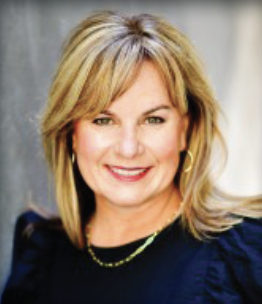 Maggie Kenefake, Founding Partner, Iron Prairie Venture Capital
Maggie Kenefake, Founding Partner, Iron Prairie Venture Capital
White collar and blue-collar: Entrepreneurship exists in both hues, and even as a child in Kansas City, Kan., Maggie Kenefake saw the career artistry involved through her grandfathers’ work—one in insurance, one with a bricklaying enterprise. “Hard work and service were instilled in me at a young age, and I understood the grit and grind of entrepreneurship through the lens of builders who are the fabric of our nation,” says Kenefake, founding partner of an early-state investment firm with a particularly focused mission. “These early experiences were instrumental in developing my thesis for Iron Prairie Ventures and shaping my views on business leadership.” Her road to venture capital began from an unexpected perspective—with a degree in psychology that she says was more accidental than strategic. But it allowed her to connect some dots in business and finish college in four years. “What I learned in my psychology classes absolutely changed my view of the world by giving me deeper insight into how behaviors and thought processes influence decision-making,” she says. “This background has been an advantage in my executive roles, providing better perspective and deeper insights regarding what drives people in everything from business management to customer acquisition and retention.” An early-career alignment with the Kauffman Foundation—an organization that lives and breathes entrepreneurship—led to her MBA, a move that she says “was critical for building my network and enhancing my ability to lead in every role I’ve had since. It created immediate and early opportunities for me at the Kauffman Foundation to manage collegiate initiatives and lead Women’s Entrepreneurship strategy.” That was the first step in her post-graduate journey, she says, leading to a fellowship in venture capital through the Kauffman Fellows program. Throughout her career, she provided support for C-level executives and students with entrepreneurial dreams. “I was first introduced and immediately always attracted to venture many years ago,” she says, and focused on ecosystem-building related to entrepreneurship and venture. A decade ago, she took the leap to the investment world. There, she embraces intellectual curiosity, passion for problem-solving and a strong ability to build and maintain relationships across networks. “These networks have benefited not only me but the companies I invest in,” she says. “It’s amazing how, over 30 years, people you’ve met circle back into your life professionally and personally, becoming champions and partners, and critical stakeholders in important networks. These relationships open doors in ways strong performance alone cannot.” Her firm fills a vital niche in regional investment: industrial tech and innovation, which she calls “the backbone of our economy.”
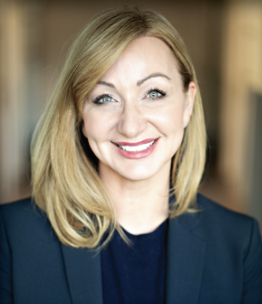 Liz Lewis, President of Consumer Banking/CMO, UMB Bank
Liz Lewis, President of Consumer Banking/CMO, UMB Bank
The average low temperature in Anchorage in February is 14 degrees. More than 3,400 crow-flying miles to Auburn, Ala., it’s 60. So it was no contest for Liz Lewis when it came time to pick a college: “I wanted someplace warm,” she says. And there she might have finished school and headed into her career, save for one other important factor: Her parents relocated to Kansas City when she was a sophomore, so she shifted college gears to Mizzou. “I just loved Kansas City,” she says, “and it’s been my hometown for more than 25 years.” She left Columbia with an economics degree, pondered law school briefly, then headed off to Arizona as a data analyst after school before coming home and embarking on a banking career. Economics, she says, “is a people science as well as a math science, understanding the role of human behavior in economic outcomes.” It also provides insights into marketing, critical thinking, problem-solving and psychology, as well as the math, all rolled into one, she says. She logged stints with Commerce Bank and CommunityAmerica Credit Union before landing at UMB two years ago this spring, where she’s chief marketing officer and president of consumer banking. “I had been in banking since 1999 in Kansas City, and UMB was always kind of the pinnacle for me,” she says. There, she wields a leadership tool kit packed with listening skills, transparency and collaboration. “Listening is No. 1,” Lewis says. “Any time you take on a new responsibility, project or department, take the time to be intentional to understand. Do listening tours to meet other people on the team and see what they think are the possibilities and the challenges. That’s the best thing a leader can do out of the gate and ongoing.” Also valuable is having the transparency to be open, she says, to be sure you know what you’re doing and why. As for collaboration, “Nobody gets a thing done alone, so it’s critical again for any team or organization to have people who are open and rely on each other.” Two college-age children and another with a fresh diploma have given her additional insights into offering career guidance. First, she says, “Don’t impose self-limitations. A lot of us think about what we can and can’t do. But it’s not about straight experience; it’s about rolling up your sleeves to learn things and being curious and open to things. I’m a big believer that you’re only able to control any outcome through the input. Bet on yourself, don’t impose self-limitations, be a good human, and get out there and learn.” As she considers the next generation of bankers, where there’s more room than ever for women in leadership roles, she’s encouraged by the possibilities. “I love the creativity and innovation in this generation, and their ability to take tech and use it in ways I didn’t know a thing about 25 years ago with a 10-key,” she says.
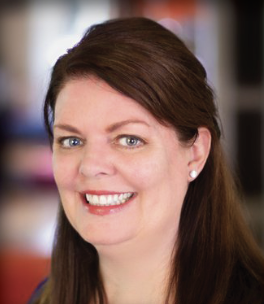 Michele Markham, President/CEO/Owner, EAG Advertising
Michele Markham, President/CEO/Owner, EAG Advertising
Almost without exception over more than two decades, Women Executives-Kansas City have touted the powerful influence of parents—especially their mothers—in helping them chart a course for success in their careers. Few of those attestations match the power of Michele Markham’s. “We were a low-income household growing up, but my mom, who only had her GED, worked her way up in the IRS to become director, with ultimate responsibility for over 800 people. Her intelligence, hard work, and determination are what finally allowed us to move into our own house in Belton in middle school.” That was a shining example, she says, of what smart, hard work could do to change your life. And hard would indeed become a foundational value—nothing was gifted to Markham as her career began with job-hopping in bartending, food service, office temp and retail, among others. Then came a break. “My first ‘real’ job was in advertising and marketing as an account executive,” she says. “I didn’t have a degree and had not worked in the field, but I was looking for a job that would hold my interest, and after three interviews, they saw potential in me, and a career was born!” Two years later, that agency was acquired by a much larger national firm owned by Omnicom, and “It opened a whole world of opportunities for me,” she says of her ascent to the C-Suite as president. At EAG, she became a minority owner in 2017 and then acquired it all in 2021. As a leader, she says she values hiring, coaching, collaborating with the right people, and setting realistic goals with rationale and support clearly stated. “It’s operating as peers—ignoring titles—to solve challenges. It’s treating people the way you want to be treated. The soft skills set the foundation for everything and are what keep us grounded through every success, every failure, and everything in between.” To anyone taking the first career step, she counsels, “Be indispensable; take on any challenge or project. Get involved in everything you can. Try things and do what you love with people you would want to have a beer with outside of work. Life is too short to put up with jerks.” Markham is excited about the potential that young women, in particular, can realize in advertising and marketing, which present opportunities for every skill set. “We need big-picture strategists, creative thinkers, digital innovators, design wizards, persuasive writers, analytical minds, social storytellers, AI enthusiasts, organized project wranglers, straight-talkers, aspiring leaders, and those bold enough to speak truth to power—all thriving in fast-paced, idea-fueled environments,” she says. “Additionally, when in an agency, you have the opportunity to learn about so many other industries and dig deep into so many other companies. It will fuel your brain, curiosity, and creativity, and you can make a difference in people’s lives. I absolutely love it.”
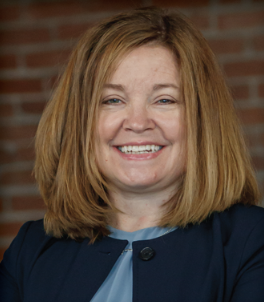 Angie McElhaney, CFO, Mark One Electric
Angie McElhaney, CFO, Mark One Electric
Never underestimate the impact that living paycheck-to-paycheck can have on someone’s career ambition and personal drive. Growing up that way in Moberly, Mo., Angie McElhaney’s family showed her early that such conditions aren’t life sentences. “Their strong work ethic, yet having financial stress, was a big driver for pursuing a career in business,” McElhaney says. “I married young and wanted to be able to provide financial stability for our family.” That would come through corporate accounting and her status as a CPA—but only after starting on the lowest rung. “When interviewing for my first job in KC as a receptionist at a local CPA firm, I noted that I enjoyed reconciling my bank account,” she recalls. “That firm not only hired me, but encouraged me to progress in my role and learn more about accounting to become an accounting paraprofessional. Nervous about how much pay that would result in, led me to push on to become a CPA,” after picking up her accounting degree from UMKC. Stops at large accounting firms eventually led her to Mark One Electric in 2018 as CFO. There she relishes the challenge of the constantly-shifting priorities in public accounting. “No day is ever the same and deadlines are constant,” she says. “Working at Mark One, the Privitera family is extremely entrepreneurial. They have other businesses. It is so much easier to talk priorities when you are working for one family that is led by a strong, smart president. We are extremely busy and are challenged every day with a variety of tasks, projects and responsibilities.” To tackle those, she draws on bedrock skills of listening, patience and setting realistic expectations. “We are faced with complicated issues on a daily basis,” McElhaney says. “Breaking them down into smaller pieces and staying calm and confident helps our team navigate and deliver.” Another valuable skill: learning to plan for the surprises that inevitably are part of leadership. “Encourage honesty and provide a safe place for people to share issues before they become even bigger problems than they need to be,” McElhaney says. “Having a strong team to engage in the problem solving is essential. When the surprise does come, stay calm, help be a part of the solution and reject the urge to be angry or frustrated. The solution may not be as difficult as it seems. Be adaptable but keep priorities in line.” Her own success in developing and leveraging relationships informs her guidance for others just starting out. “Stay connected with peers and seek out mentoring relationships with people who are positive influences,” she advises. “Soak up everything that you are learning, take notes and remember so you can keep learning more and contributing. Keep working on being a better person, reflecting frequently.”
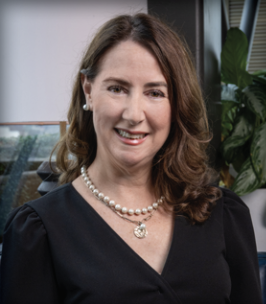 Bridget Romero, Partner, Lathrop GPM
Bridget Romero, Partner, Lathrop GPM
Many a lawyer takes a straight path through college to J.D. Bridget Romero took several of them, and they led her to Peru, Bosnia, Vietnam and Somalia, doing volunteer work after earning her degree in Spanish (minor in Sociology) from California’s Santa Clara University. That journey of discovery had its intended effect: it provided direction and purpose. “This is going to sound cliché, but I went to law school because I wanted to help people,” she says. “Seeking justice and fairness in both personal and professional realms of life motivates me.” She does just that as a partner in the employment-law practice at Lathrop GPM. During her travels, she says, “learning about the laws impacting refugees renewed my childhood interest in becoming a lawyer and it felt like the right time to go to law school—to continue helping people.” She came back closer to her Columbia roots for law school at Mizzou, and was on her way. Romero traces elements of her own success back one generation, to her parents—her father, in particular. He was one of 10 kids raised on a family farm in Nebraska, and got through medical school the hard way, working on a road-construction crew. “Dad’s work ethic and high achievement have inspired me over the years and provided a true north for our family,” Romero says. “My parents taught us that nothing can replace hard work; and having peace of mind as you navigate life’s twists and turns is of paramount importance.” The longstanding yen to help others morphed into a study of systems affecting people. “I love studying other cultures, and I am a natural-born people person,” she says. “Together, that led me to employment law. Work in this field can be difficult, but also rewarding.” It also demands, she says, a high degree of emotional intelligence—”which is not something all lawyers are known for” she notes. It helps to be easily approachable, as well, and she prides herself on serving as a formal mentor to new associates and also as an informal sponsor within the firm for newer female partners. “In particular, I look for opportunities to introduce junior partners and senior associates on the cusp of partnership to clients for whom I am the relationship partner, with the goal of expanding the relationship and sharing origination credit, fostering revenue growth for the firm as well as increased compensation for the individual attorney(s),” she says. “I am a believer in reaching out to bring others with me as I move forward in my career. I also believe in making sure new voices are heard at all levels, encouraging people to find their own voice, and celebrating the accomplishments of women and others at the firm, from business professionals, to support staff, to attorneys.”
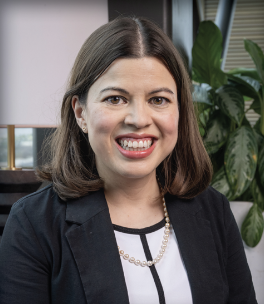 Stef Seger, Community Development Regional Manager, Meta
Stef Seger, Community Development Regional Manager, Meta
One can find limitless numbers of career-self-help books out there. Stef Seger suggests starting with a quicker read: Dr. Seuss. More specifically, his tale of The Lorax, a story that would inspire both her professional and philanthropic tracks. “My interest in advocacy began at a young age, inspired by Dr. Seuss’s Lorax, who spoke up for those who couldn’t speak for themselves,” says Seger. “Throughout my life and career, I have seen firsthand the need for and value of advocacy and community work.” Caring for the most vulnerable ultimately strengthens society. That’s how she was able to leverage a career in government relations into her position as regional community-development manager for Facebook parent Meta, as well as becoming something of a volunteer all-star with multiple non-profits. “I realized that to be an effective advocate, I needed to understand the systems and structures that required change,” Seger says of the road to Meta. It started with a degree in political science from Ohio State, which gave her a deeper understanding of complex systems and taught her to research, analyze and present compelling cases for change. Then came a master’s in public-policy management, supplemented by another advanced degree, in social work. Thusly armed for life, she says that “if my business acumen, organizational energy, and connections can further the mission of a community organization, I’m happy to share that. It allows me to give back what has been given to me, opportunity. I have always gained more than I’ve given.” All of that is layered over her upbringing in Stafford, Va., where she learned the value of collective strength at the community level. “My siblings, teachers, peers and mentors shaped my views on business and leadership,” she says. “I learned that community is not just about being part of a group, but also about building relationships and working together to create positive change. My role models, teachers, and friends—who have become family—demonstrated a strong sense of social responsibility and a commitment to doing what is right, even when it’s difficult.” After coming to Kansas City in 2017 at Children’s Mercy, she made the leap to a new business sector—data centers—in part to satiate her curiosity about where else her skill set might fit. “I was thrilled to discover that Meta has positions within its data-center communities that focus on strategic partnership and community collaboration, ultimately benefiting the long-term vitality of these communities,” she says. “The opportunity to partner with local leaders and organizations in the community where I live, give, work and play resonated deeply with me. In addition, I’d have the ability to make a meaningful impact in new ways in the Kansas City community, as well as in data-center communities in Iowa, Nebraska and Minnesota.”
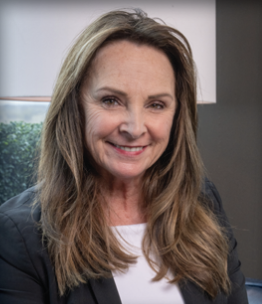 Toni Walsh, EVP-HR, Country Club Bank
Toni Walsh, EVP-HR, Country Club Bank
Her path to leadership, Toni Walsh candidly says, didn’t begin in a traditional classroom but in the school of life. “I lost my mother and sister under separate tragic circumstances when I was very young,” she says. “I grew up with my grandparents who lived through the Great Depression and several wars. They were hard-working and kind; they also had little patience for whining or ‘I can’t.’” That life trajectory was further altered when a car accident claimed the life of her oldest son’s father while she was still pregnant. At that point, “college was no longer my immediate path,” Walsh says. “Instead, that experience gave me tools. I was working three jobs with a new baby. I learned about perseverance, resiliency and doing whatever it took to see to the important things. It taught me empathy, compassion and humility. Had I not experienced those challenges, I would not have the toolbox I have now. I’m grateful that my road has been more like a rough gravel road than a smooth paved one.” Today, she oversees human resources functions for Country Club Bank as executive vice president. “I have always believed in continuous learning,” Walsh says. “Education doesn’t stop at a diploma—it’s an ongoing process that happens in the workplace, in relationships, and through personal experiences. I’ve made it a point to absorb knowledge from every situation, treating each challenge as a lesson.” She also became a certified senior HR professional through the Society for Human Resource Management, and completed both the HR and advanced HR programs at the Graduate School of Banking at the University of Wisconsin-Madison. She’s also a certified executive coach. When her career started, she says, there was no clear vision, “but what I did know was that I had a deep interest in people. At the time, I hadn’t yet framed this interest in terms of human resources or corporate leadership—I just understood that people are at the heart of everything. I wanted to contribute in a meaningful way, and over time, I discovered that banking and HR provided the perfect space for me to do so. I can’t stress enough that although IQ will get your foot in the door, if you don’t have EQ, then no matter how brilliant you are, you will not be successful in the long term. I’ve seen that over and over in the workplace.” Her ability to play through the bad hand she was dealt in life traces back to lessons from her family when growing up. “They taught me ‘salt’ and they challenged me, starting with horses when I was a young girl,” Walsh says. “Even horses can teach a number of life lessons that serve you well. We all know the expression ‘get back on the horse’—I certainly lived that many times over.”
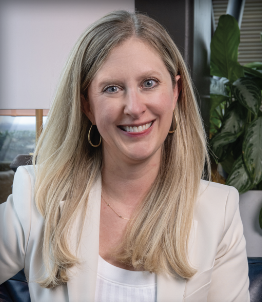 Megan Whitman, EVP, BRR Architecture
Megan Whitman, EVP, BRR Architecture
Megan Whitman’s impact on this world is grounded in example. Not just what she learned about life success while growing up in Lee’s Summit, but what she’s doing for those who will follow her path. “Both of my parents worked full-time,” she says, “Their dedication and work ethic instilled in me a strong sense of independence from an early age. I also was fortunate to be surrounded by several strong women within my extended family who served as powerful role models.” Her takeaway from that, she says, was that success is built not just through hard work, but perseverance, and the confidence to pursue ambitious goals. “Their influence shaped my belief that with determination, anything is possible.” Today, Whitman is executive vice president for BRR Architecture, the only employer she’s known since earning her degree in architecture from Kansas State. In that capacity she, too, stands as an example. “I believe in servant leadership, where putting the team first leads to collective success,” Whitman says. “By prioritizing mentorship, active listening, and empowerment, I try to create an environment where individuals feel both valued and motivated to achieve their goals. When a team is supported and given opportunities to grow, their success becomes a shared victory.” The world of design held an early appeal while growing up in a creative family full of artists. “My sister, who is 10 years my senior, pursued a career in architecture. Watching her thrive in what was traditionally a male-dominated field further fueled my desire to push boundaries and carve my own path within the industry,” Whitman says. “Her success reinforced my confidence that I could also make an impact through design and creative problem-solving.” She spent the first few years of her career not just mastering the basics of design, but the traits that make the difference between personal success and organizational achievement. “With each new position, I have learned how important building relationships are and how sharing success with others drives success,” Whitman says. “That collaboration and focus on personal growth is one of the reasons BRR has been a great fit for me in my career.” And the move to leadership allowed her to make an impact beyond her technical skills. “My passion for mentoring and empowering others naturally led me toward leadership,” she says. “I found fulfillment in helping colleagues grow, develop their potential, and achieve success.” There is true value, she says, for young people looking at the blank canvas of their careers to see what the real picture can yield. So she advises them to “be someone who is willing to bring forward new ideas while also being curious. Learn as much as possible from others who may have different experiences or perspectives than you do.”